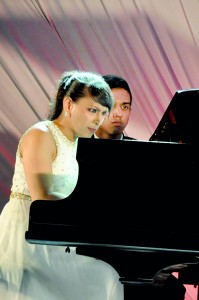Turning her body and soul into music
Sitting across from her now, it’s impossible to tell that Shani Diluka went to bed exhausted, her head aching. It was impossible to detect even last night, when she took her bows with violinist Gabriel Le Magadure and cellist Valentin Erben, basking in the wild applause from their audience at the end of a gruelling two hour concert staged on behalf of the Mano Chanmugam Music Foundation.

Shani the intense pianist:At her concert in Colombo at the Cinnamon Grand and (below left) in a relaxed mood. Pix by Indika Handuwala
Then, dressed in a glittering white gown, Shani looked every inch the international star she is, a pianist hailed again and again as one of the greatest of her generation. Her exhaustion is not routine. In part because her visits to Sri Lanka, the home of her parents, have been so infrequent of late, Shani wanted to offer local audiences a selection of exquisitely challenging masterworks and to play for far longer than she normally would. It is why being told it appeared effortless is for her the greatest of compliments, simply because it is the opposite that is true. “It is the result of so much work to be free of everything. To be free of technique, of thought…there is so much work before your body can just become music.”
The first Sri Lankan to be born in the principality of Monaco (“they looked in their records and couldn’t find anyone before me”), Shani comes from artistic stock. Her father, Gilbert Abeygoonaratne, has been at various times a painter, author, traveller and professional chef. He left home as a young man, returning again to marry Shivanthi Jayasinghe, before heading back out into the world. The couple settled in Monaco where their daughter, at the tender age of 6, was inducted into a programme created by Princess Grace which singled out particularly promising youngsters. (Her sister Rika is also a talented pianist.) Shani remembers spending many months being taught theory before she was presented with a range of instruments and asked to pick the one she would like to study. The piano seemed the most natural choice, at least in part because it allowed her to compose with ease.
At the age of 12, she and her family faced what she now sees as a pivotal moment in her career. (The same year she had been part of a concert at the Acropolis in Nice, having gained increasing acclaim since her first public recital at age 9.) It was suggested that she follow in the footsteps of other musical prodigies and give up school so she could devote herself exclusively to the piano.“I think my Sri Lankan culture saved me from that,” she tells the Sunday Times. “My parents and I discussed it together and they thought that even a tree has to take its time to grow.”
The decision to let the bright little girl keep going to school where she so enjoyed the company of her friends proved a wise one. “I had many friends who were prodigies and by the time they were 18 or 19 they could not cope with life, because they realised they were unprepared to be adults. Some even gave up the piano. I was lucky.” Shani would go on to win the first prize in the Académie de Musique (Fondation Prince Rainier III) and subsequently enrolled in the Conservatoire de Paris in 1997 – she shows no signs of  wanting to quit her extraordinary career in music but remains determined to make sure it doesn’t devour her time. “You can’t stay in a box. If you want to play music, you must live.”
wanting to quit her extraordinary career in music but remains determined to make sure it doesn’t devour her time. “You can’t stay in a box. If you want to play music, you must live.”
Today, that determination (and the ability to get by on very little sleep) allows her to travel widely, go out with friends and family, cultivate a wide range of interests and still spend 8 hours a day “around” the piano. (She quit composing at age 15 and says with characteristic blend of focus and humility: “when I was playing Bach and Schubert, I thought ‘this is so deep and so refined. My music was not making me a better person, it’s not bringing me enough reason to do this’.”) Of these 8 hours, Shani may spend up to 5 actually playing but the rest of her time is invested in creating that intangible emotion that so elevates her playing. She reads her sheet music like it were a book. You imagine, watching her perform, that she is pure feeling; that her fingers find their way inevitably, effortlessly, through even the most complicated piece. Instead, this is what she arrives at after hours of labour.
She begins with analysis. “The sheet music is really like a map. It’s like a country you have to discover.” As much as she can, she tries to absorb the context in which the composer worked, sometimes even going back to look at their original manuscripts. She studies not just the composer’s life and predispositions, but reads, listens and looks at things she knows may have influenced the musical score in her hands – whether it is reading Shakespeare’s The Tempest when performing Beethoven or studying the impressionist paintings of James Abbott McNeill Whistler when tackling Debussy. “There are just these black and white dots on the page, but our work is to find out the meaning of all this,” she says.
At the piano, Shani plays with strength and flair. You can’t help but notice that her lips move and her expression shifts as if she were in an intense conversation. It is here that the performance becomes unique, her own emotion added to the composer’s intentions. Shani has a vivid, quirky imagination and she says that when she is playing a piece, she frequently envisions herself as a part of it. “When I play Debussy, I can see a pagoda, the water. It’s a dream Debussy had because he never went to Asia. The [March of the] Troll’s spirit is very different. I can see the trees, the lake. I just imagine I am there playing with the trolls around me.”
While watching her play affords its own pleasures, Shani has never lacked for listeners: Her recording of Mozart by France Music was chosen to be aired on 150 International Radios worldwide for the Commemoration of Mozart’s 150th Anniversary and her many CDs have brought her music to fans across the globe and earned her honours such as the ‘The Choc du Monde de La Musique’ and the RTL Gold (both won twice for different discs). She capped of an incredibly hectic 2013, which included a prestigious recital tour of Germany, with another album. Road 66, created in collaboration between Shani and the incomparable French soprano Natalie Dessay was inspired by Jack Kerouac and “built on the idea of following in his footsteps,” says Shani, explaining that she imagined this playing on the car stereo as she followed him down the legendary Route 66. (The official CD of the Folle Journée Festival, Road 66 is already number 1 on the celebrated Qobuz charts.)
However, while the inclination to take to the road exists, the time may not. Just in the last month, Shani estimates she took 10 flights and 9 train journeys to perform at various venues. (She and Gabriel are married and live in Paris, both keeping to the hectic schedules of professional musicians.) Still, she carves out time every month to play in a range of odd venues including the main prison at Nantes and other prisons in the locality as well as for the poor at the CASH festival near Paris. Shani remembers being particularly nervous about facing male inmates convicted for serious crimes but says her heart ached when she walked past their families – children and grandparents – on her way in. Though some of her audiences haven’t listened to classical music, she is unsurprised when it reduces them to tears, recalling memories of their childhood or people they love. “The soul goes to the soul, it’s a very direct connection,” she says.
The same could easily be said of her collaboration with Gabriel and Valentin. Though they performed for free, they spared no effort in rehearsals. “What’s wonderful about chamber music, that even though we have decided many, many things in advance, during a concert, the magical can happen and we improvise…it’s living a special moment together,” says Shani. She believes the intimacy bred through years of playing together nurtures a “democratic dialogue,” in addition to which the trio benefit greatly from Valentin’s great experience – “he is just a legend.” Though he has toured the world, it’s Valentin’s first visit to Sri Lanka. He flew here with his instrument, a gorgeous Matteo Gofriller Cello of 1722, occupying the seat next to him. “I love to play with these two young people,” he says “it brings me great happiness.”
Both musicians (Gabriel is already back on the concert round) comment on the interest in classical music among their audience in Colombo, and Shani is determined to come back and give master classes next year. (She speaks Sinhala with “a very bad French accent.”) It will be a pleasure to give back to a country whose values she believes she inherited –“coming here always showed me this other way to be,” she says. “Sri Lanka has that connection with life, with nature, with people, which is very beautiful.”We are left fortunate that this is so: for if Shani Diluka is nourished in playing here, her music in turn nourishes all who listen.
Funds raised from Shani, Valentin and Gabriel’s concert in Sri Lanka will go toward supporting local musicians as part of the work of the Mano Chanmugam Music Foundation. BMW were the event’s platinum sponsors.


